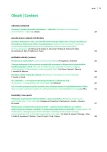AT1 blockers – comparability with ACE inhibitors
Authors:
Václav Monhart 1,2
Authors‘ workplace:
Interní klinika 1. LF UK a ÚVN – VFN Praha
1; Ambulance nefrologie, Synlab Czech s. r. o., Praha
2
Published in:
Vnitř Lék 2017; 63(4): 267-271
Category:
Reviews
Overview
The reduction in overall mortality, cardiovascular mortality and the occurrence of myocardial infarction in patients treated with AT1 blockers is comparable with the use of ACE inhibitors. In addition, there is a lower proportion of AT1 blockers withdrawal of treatment due to adverse reactions.
Key words:
ACE inhibitors – AT1 blockers – cardioprotection – hypertension – renin-angiotensin-aldosteron system
Sources
1. Mielke MM, Rosenberg PB, Tschanz J et al. Vascular factors predict rate of progression in Alzheimer disease. Neurology 2007; 69(19): 1850–1858.
2. Roselli F, Tartaglione B, Federico F et al. Rate of MMSE score change in Alzheimer’s disease: influence of education and vascular risk factors. Clin Neurol Neurosurg 2009; 111(4): 327–330. Dostupné z DOI: <http://dx.doi.org/10.1016/j.clineuro.2008.10.006>.
3. Poulter N. ARBs in hypertension. Br J Cardiol 2010; 17(Suppl): s6-s9. Dostupné z WWW: <https://bjcardio.co.uk/2010/05/arbs-in-hypertension/>.
4. Li EC, Heran BS, Wright JM. Angiotensin converting enzyme (ACE) inhibitors versus angiotensin receptor blockers for primary hypertension. Cochrane Database Syst Rev 2014; (8): CD009096. Dostupné z DOI: <http://dx.doi.org/10.1002/14651858.CD009096.pub2>.
5. Abraham HM, White CM, White WB. The comparative efficacy and safety of the angiotensin receptor blockers in the management of hypertension and other cardiovascular diseases. Drug Saf 2015; 38(1): 33–54. Dostupné z DOI: <http://dx.doi.org/10.1007/s40264–014–0239–7>.
6. Dézsi CA. The different therapeutic choices with ARBs. Which one to give? When? Why? Am J Cardiovasc Drugs 2016; 16(4): 255–266. Dostupné z DOI: <http://dx.doi.org/10.1007/s40256–016–0165–4>.
7. Verdecchia P, Angeli F, Cavallini C et al. Blood pressure reduction and renin-angiotensin system inhibition for prevention of congestive heart failure: a meta-analysis. Eur Heart J 2009; 30(6): 679–688. Dostupné z DOI: <http://dx.doi.org/10.1093/eurheartj/ehn575>.
8. Verdecchia P, Gentile G, Angeli F et al. Beyond blood pressure: evidence for cardiovascular, cerebrovascular, and renal protective effects of renin-angiotensin system blockers. Ther Adv Cardiovasc Dis 2012; 6(2): 81–91. Dostupné z DOI: <http://dx.doi.org/10.1177/1753944712444866>.
9. Bangalore S, Fakheri R, Toklu B et al. Angiotensin-converting enzyme inhibitors or angiotensin receptor blockers in patients without heart failure? Insights from 254,301 patients from randomized trials. Mayo Clin Proc 2016; 91(1): 51–60. Dostupné z DOI: <http://dx.doi.org/10.1016/j.mayocp.2015.10.019>.
10. Widimský J, Widimský J, jr. Esenciální a sekundární hypertenze pro praxi. Triton: Praha 2005. ISBN 80–7254–711–9.
11. Widimský J, Monhart V. Antagonisté receptorů angiotenzinu II. typu AT1 (AT1 blokátory). In: Widimský J et al. Hypertenze. 3. vyd. Triton: Praha 2008 : 362–379. ISBN 978–80–7387–077–5.
12. Widimský J, Monhart V. Antagonisté receptorů angiotenzinu II. typu AT1 (AT1 blokátory). In: Widimský J et al. Antagonisté renin-angiotenzin-aldesteronového systému. Triton: Praha 2011 : 113–158. ISBN 978–80–7387–499–5.
13. Widimský J, Widimský J jr. Farmakoterapie hypertenze. Maxdorf: Praha 2016. ISBN 978–80–7345–477–7.
14. Van Zwieten PA, Farsang C. Interactions between antihypertensive agents and other drugs. Blood Press 2003;12(5–6):351–352.
Labels
Diabetology Endocrinology Internal medicineArticle was published in
Internal Medicine

2017 Issue 4
-
All articles in this issue
- Diabetic foot syndrome: importance of calf muscles MR spectroscopy in the assessment of limb ischemia and effect of revascularization
- Controversies around QALYs
-
The role of cardiovascular magnetic resonance imaging in the diagnosis of hypertrophic cardiomyopathy.
Part II - Novelties in the treatment of heart failure
- AT1 blockers – comparability with ACE inhibitors
- How to create cooperative patient for antihypertensive and hypolipidemic therapy
- Relapsing autoimmune pancreatitis type 1: case report
- Indeterminate cell histiocytosis - disappearance of skin infiltration following electron beam therapy and an application of 2-chlorodeoxyadenosine: case report
- Antikoagulační terapie dabigatranem vs rivaroxabanem u seniorů ve věku nad 65 let: porovnání dat „head to head“
- Gender and Coronary Artery Disease – a challenge for the 21st century
- Internal Medicine
- Journal archive
- Current issue
- Online only
- About the journal
Most read in this issue
- Relapsing autoimmune pancreatitis type 1: case report
- Controversies around QALYs
- Novelties in the treatment of heart failure
- AT1 blockers – comparability with ACE inhibitors
